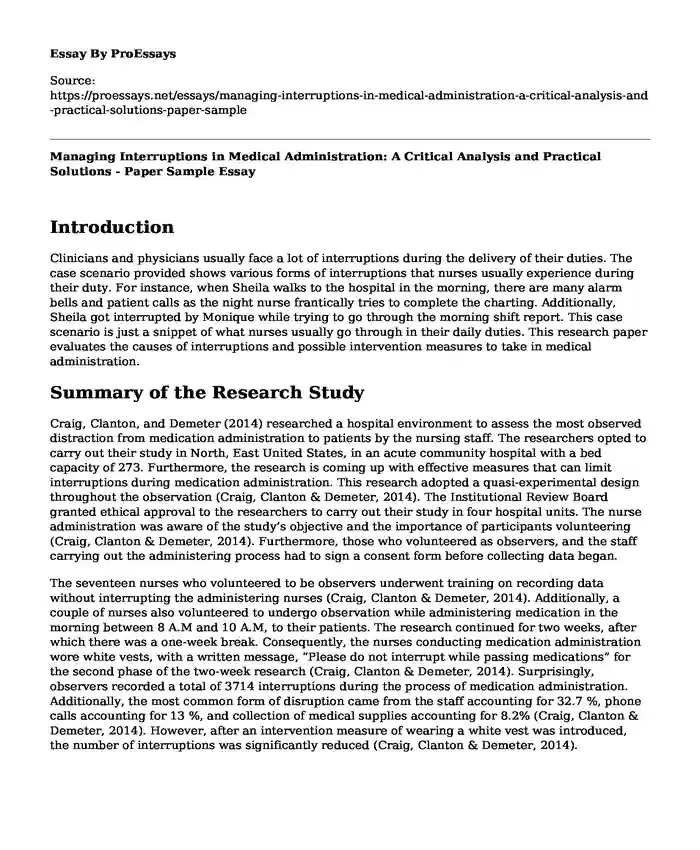Introduction
Clinicians and physicians usually face a lot of interruptions during the delivery of their duties. The case scenario provided shows various forms of interruptions that nurses usually experience during their duty. For instance, when Sheila walks to the hospital in the morning, there are many alarm bells and patient calls as the night nurse frantically tries to complete the charting. Additionally, Sheila got interrupted by Monique while trying to go through the morning shift report. This case scenario is just a snippet of what nurses usually go through in their daily duties. This research paper evaluates the causes of interruptions and possible intervention measures to take in medical administration.
Summary of the Research Study
Craig, Clanton, and Demeter (2014) researched a hospital environment to assess the most observed distraction from medication administration to patients by the nursing staff. The researchers opted to carry out their study in North, East United States, in an acute community hospital with a bed capacity of 273. Furthermore, the research is coming up with effective measures that can limit interruptions during medication administration. This research adopted a quasi-experimental design throughout the observation (Craig, Clanton & Demeter, 2014). The Institutional Review Board granted ethical approval to the researchers to carry out their study in four hospital units. The nurse administration was aware of the study’s objective and the importance of participants volunteering (Craig, Clanton & Demeter, 2014). Furthermore, those who volunteered as observers, and the staff carrying out the administering process had to sign a consent form before collecting data began.
The seventeen nurses who volunteered to be observers underwent training on recording data without interrupting the administering nurses (Craig, Clanton & Demeter, 2014). Additionally, a couple of nurses also volunteered to undergo observation while administering medication in the morning between 8 A.M and 10 A.M, to their patients. The research continued for two weeks, after which there was a one-week break. Consequently, the nurses conducting medication administration wore white vests, with a written message, “Please do not interrupt while passing medications” for the second phase of the two-week research (Craig, Clanton & Demeter, 2014). Surprisingly, observers recorded a total of 3714 interruptions during the process of medication administration. Additionally, the most common form of disruption came from the staff accounting for 32.7 %, phone calls accounting for 13 %, and collection of medical supplies accounting for 8.2% (Craig, Clanton & Demeter, 2014). However, after an intervention measure of wearing a white vest was introduced, the number of interruptions was significantly reduced (Craig, Clanton & Demeter, 2014).
Summary of the Appraisal of the Article
According to the background information and literature review provided, the investigation topic carries weight matters since the errors committed during an interruption can have a fatal outcome. The research’s strength manifests that all the participants volunteered, and the study followed ethical standards to collect data. Additionally, the research questions seek to capture the major factors that contribute to an interruption during medication administration. However, the research has some form of limitations since it does not mention or consider the interruptions that the observers might experience. Additionally, research done on people without their knowledge yields correct results compared to informing every participant. This research looked like a controlled environment. The intervention measures also take only one approach of wearing a white vest, which is not sufficient to draw conclusive facts.
Implications/Conclusion
The case of nurse interruptions during a medical administration can have a serious consequence considering that the number of interruptions recorded is high. However, the hospital can develop protocols to limit interruptions since some of them are manageable cases. For instance, one can wear white vests with warning signs (Westbrook et al., 2017). The hospitals can also come up with a policy that forbids the use of phones during medical administration (Westbrook et al., 2017). Since the research established that the staff is the leading cause of interruptions – the hospitals can arrange to train all staff members to refrain from such habits (Bertolazzi & Perroca, 2020). The nurses can also have a checklist of all the supplies they need and then ensure all the medications required are available before they can begin the process.
References
Bertolazzi, L. G., & Perroca, M. G. (2020). Impact of interruptions on the duration of nursing interventions: A study in a chemotherapy unit. Revista da Escola de Enfermagem da USP, 54.
Craig, J., Clanton, F., & Demeter, M. (2014). Reducing interruptions during medication administration: The White Vest study. Journal of Research in Nursing, 19(3), 248-261. https://doi.org/10.1177/1744987113484737
Westbrook, J. I., Li, L., Hooper, T. D., Raban, M. Z., Middleton, S., & Lehnbom, E. C. (2017). Effectiveness of a ‘Do not interrupt’bundled intervention to reduce interruptions during medication administration: a cluster-randomized controlled feasibility study. BMJ quality & safety, 26(9), 734-742.
Cite this page
Managing Interruptions in Medical Administration: A Critical Analysis and Practical Solutions - Paper Sample. (2023, Dec 31). Retrieved from https://proessays.net/essays/managing-interruptions-in-medical-administration-a-critical-analysis-and-practical-solutions-paper-sample
If you are the original author of this essay and no longer wish to have it published on the ProEssays website, please click below to request its removal:
- A Qualitative Data Collection Method Needed to Determine the Source of the Outbreak
- My Work Experience as a Registered Nurse Paper Example
- The Black Americans Community's Determinants of Health Essay Example
- Paper Example on Natural Disasters: Challenges in Risk Management Despite Technological Advancement
- Essay Sample on Course Insights for Nursing: Strategies for Improved Critical Care
- Essay Example on Ensuring Quality Health Care Access to All in America
- Essay Example on Covid-19 Impact: US Economy and Global Industries







